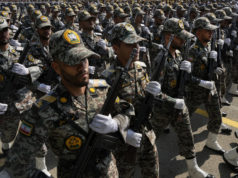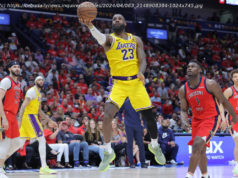Enthusiasm for the national team is reaching fever pitch in England, which has been cleaved by politics and hasn’t had much to celebrate of late.
LONDON — In the giddy aftermath of England’s 2-0 quarterfinal victory over Sweden in the World Cup on Saturday, Andy Ward staggered out of a pub and into a tattoo parlor. He stripped off his shirt and bared his chest to a shaver. Then a tattoo artist etched St. George’s Cross — the English flag — over his heart.
Mr. Ward, 51, a decorator, concedes he might have been a bit tipsy at the time. But he doesn’t regret his decision, at all.
“No one expected this,” he said on Monday, sipping a pint at a southwest London pub and showing off his new tattoo. “We only dreamed of getting so far. We’re not used to this kind of success.”
He was talking about the fact that England hasn’t won the World Cup since 1966 — and, more recently, has endured one World Cup disappointment after another. Suddenly, a young, dynamic team led by a manager who has become an unexpected national hero is two wins away from reclaiming the cup, while England, which has been cleaved by politics and hasn’t had much to celebrate of late, is going, well, nuts.
So nuts, in fact, that in a week when the government of Prime Minister Theresa May has been plunged into new chaos — with ministers resigning and the fate of the country’s effort to exit the European Union more uncertain than ever — much of the nation seems determined to take a timeout from the acrimonious politics and bask in something recently in short supply: Unity, not to mention blind hope.
“This World Cup feels like a distraction from everything,” said Michael Gibbons, 44, author of “When Football Came Home: England, the English and Euro 96” who ticked off a list of tragedies last year, such as the deadly fire at the Grenfell Tower housing block in London, or the terror attacks in Manchester and London — not to mention the ugly aftermath of the Brexit vote.
“The divisiveness over the Brexit vote and what that has done to society is obvious,” he said, adding: “So the England run has been a kind of serotonin to all of that.”
Far from everyone is basking in England’s newfound warmth and fuzziness. Croatia, which is playing England on Wednesday in the semifinals, has very different opinions, for one. And large parts of the rest of Britain — especially sections of Scotland and Wales — would be absolutely pleased to see their English neighbors lose, and lose badly.
But within England itself, many fans, largely reared on a steady diet of soccer disappointments and trained to brace for World Cup matches with apprehension, have responded with outbursts of unabashed euphoria that have caught people by surprise (and some sporadic cases of alcohol-influenced vandalism, including at an Ikea outlet after the Sweden win). On social media, people are joking — at least partly joking — that the team’s manager, Gareth Southgate, now famous for wearing a tie and waistcoat during matches, might do a better job than the embattled Ms. May at steering the country through Brexit.
The excitement has even moved tennis officials at Wimbledon to soften their policy requiring phones be shut off during matches to allow fans at Center Court to watch the soccer games, albeit without the sound. (Some players noticed when English soccer fans left the stands during one of the team’s matches.) Grown men have broken down in tears and sung a famous English soccer song, “Three Lions,” which is again topping music charts, 22 years after its release.
Even though the national team is full of bright young players who have performed well in the Premier League, the top level of English soccer, the current members of the squad are largely inexperienced when it comes to the international arena. That helped dampen expectations before the World Cup, and few thought the team would advance deep into the tournament, let alone win it.
The pivotal moment came in the first knockout round, last week, when England won a penalty shootout for the first time in its World Cup history last week, beating Colombia.
David Rawlins, an England supporter who attended the game in Russia, said: “The whole stadium’s heart was thumping. You could hear it.”
“When we won, everything changed,” he added. “People started to believe in England and football again.”
England’s relative success has posed a problem for fans in other parts of the United Kingdom, however. Ross Barnett, an England fan who has lived in Glasgow, Scotland, for 17 years, said that the Swedish team had enjoyed widespread support at his local pub on Saturday, and that some fans of England had left because of the antagonism.
“It’s better not to openly cheer for England up here,” Mr. Garnett said in a phone interview
Historically, the English national team has been almost synonymous with Britain. In the past, it would have been far more common to see supporters toting memorabilia with the Union Jack, the British national flag, and singing “Rule, Britannia!” when urging on the England team. Many in the crowd at Wembley Stadium in London for the 1966 final, for example, waved Union Jacks, and the mascot for that tournament, hosted solely by England, had a Union Jack jersey.
By 1996, that had largely changed. England hosted the European Championship that year, and the flag of St. George — a red cross on a white background — had taken over almost completely from the Union Jack as the emblem used by fans of England. While supporters of the other countries in the United Kingdom — Scotland, Wales and Northern Ireland — have generally used their own flags, England fans’ embrace of the red cross of St. George seemed significant. And it has, mostly, stuck.
David Goldblatt, the author of “The Game of Our Lives: The Meaning and Making of English Football,” said the change was an important show of identity. “In this World Cup, the national football team has put Englishness on full public display in a way that we have never seen with the other few civic institutions, such as the English National Opera, the Church of England and English Heritage,” he said.
The team also reflects the diversity of England, with players from all over the country, not just from the relatively wealthy south, and it includes some from immigrant backgrounds .
“We’re not a team where we just turn up and we’re waltzing around, strolling around like we’ve got an entitlement,” said Mr. Southgate, the manager, during a news conference on Saturday. “We’re lads who have come from Barnsley and Leeds and Bolton and Blackburn,” he noted, referring to several northern English cities that often complain of being neglected by politicians in London.
The England manager’s refreshing approach — a mix of calmness, humility and realism — has also resonated, and made him a social media sensation. More than a few commentators have noted the contrast between the manager and the bumptious politicians fighting with another over Brexit.






